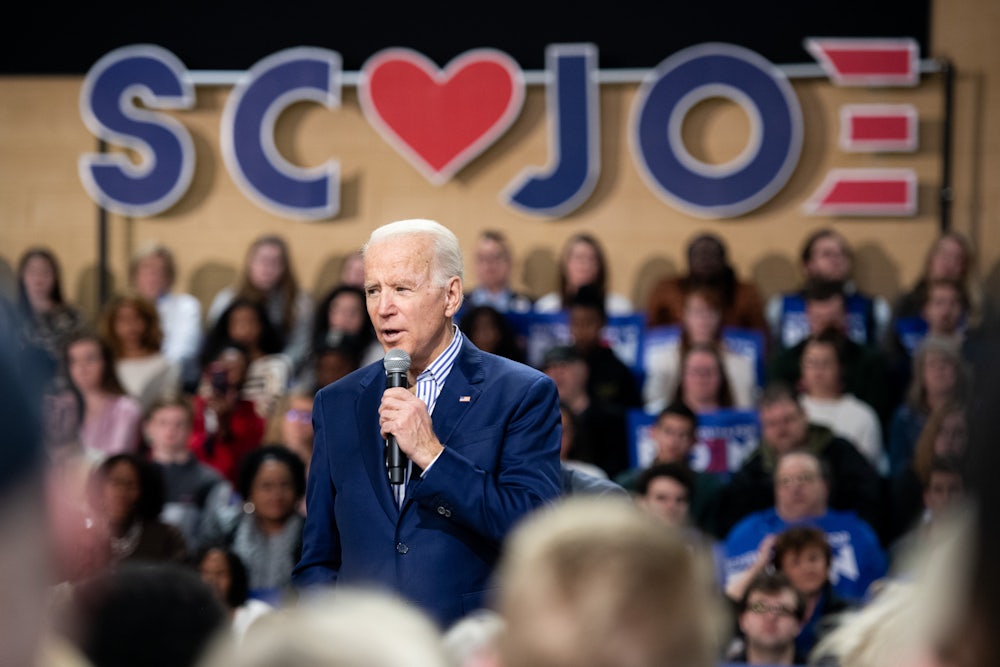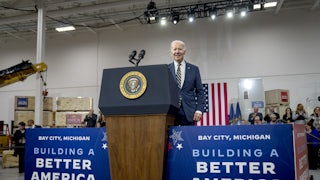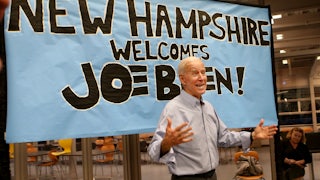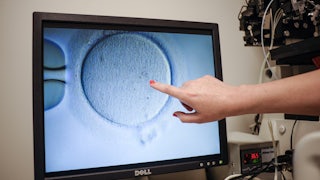Joe Biden may have been a failed college football player, but he demonstrated Thursday night his mastery of the hidden-ball trick. Around the time Thursday night that waiters were serving California sturgeon caviar at Biden’s first state dinner, the president released a letter to the Democratic Party upending the 2024 primary calendar.
Under the Biden plan, South Carolina would be vaulted into the first slot on the calendar, displacing the much-maligned Iowa caucuses and the venerable but oft-criticized New Hampshire primary. New Hampshire and Nevada would then share the second week on the primary schedule, followed by Georgia and Michigan, each a week apart. Even though this schedule represents a radical break with tradition—and New Hampshire Democrats are in an uproar—the party’s Rules and Bylaws Committee is highly likely to approve the president’s plan when it meets Friday and Saturday.
Most of the overnight coverage interpreted this dramatically revamped schedule as evidence of Biden’s commitment to diversity, since both South Carolina and Georgia have majority-Black electorates in Democratic presidential primaries. As Biden put it in his letter, “We must ensure that voters of color have a voice in choosing our nominee much earlier in the process and throughout the entire early window.”
But the Biden plan also includes a subtle but effective ploy to minimize the chances that he’d face a left-wing challenger in the primaries if the 80-year-old president, as expected, seeks a second term. More than that, Biden has created a template beyond 2024 to lessen the odds that future versions of Bernie Sanders will get liftoff in the early Democratic primaries.
The key ingredient is that Black voters, particularly in the South, can skew moderate and favor judging candidates’ viability to ensure a Democrat wins the general election, and are unlikely to gravitate to the same candidates who thrill Democrats in Brookline, Massachusetts, Ann Arbor, Michigan, and Santa Monica, California. In 2016, running against Hillary Clinton, Sanders was trampled in the South Carolina and Georgia primaries. And of course, Biden owes his presidency to his landslide victory in the 2020 South Carolina primary after being upended by Sanders and Pete Buttigieg in Iowa, New Hampshire, and Nevada.
The Biden calendar comes with two insurance policies: thwarting an insurgent candidate in the first primary in South Carolina and then, if that candidate still gets liftoff, bringing them back down to earth in Georgia, two weeks later. If past patterns hold, roughly a dozen states will then cluster their primaries on a Super Tuesday, a week after Michigan. What this means, in reality, is that by the time candidates start to tour Detroit and Grand Rapids, the field will likely have narrowed down to just a few remaining contenders.
The big losers in all this scheming are New Hampshire and Nevada, two states that nurtured dreams of going first. Not only are they consigned to the second week on the calendar, but unlike the other early states, they would also share the same primary day. That East-West doubleheader would dilute the impact of an upset in either state. Nevada, in particular, would be marginalized since its presence in the Pacific Time Zone and its history of slow vote counts will likely mean that most of the primary-night headlines will belong to New Hampshire.
The White House undoubtedly considers New Hampshire and Nevada (which up to now has picked its delegates through caucuses) to be loose-cannon states since they went for Sanders in both 2016 and 2020. Biden, who launched his first campaign for president 35 years ago, knows all too well New Hampshire’s history of nurturing mavericks, beginning with Eugene McCarthy’s historic challenge to Lyndon Johnson over the Vietnam War in 1968. (Yes, it was a half-century ago, but Biden boasts a long memory.) Even more relevant to Biden is that right-wing populist Pat Buchanan (a trailblazer for Donald Trump) won 40 percent of the New Hampshire GOP primary vote in 1992 against a sitting president, George H.W. Bush.
There is less cosmic meaning to the selection of Michigan as the fifth state on the Biden calendar. By reputation, especially under Governor Gretchen Whitmer, Michigan is regarded as more of a party-loyalty state than Minnesota, its more rambunctious rival for the Midwestern slot to replace discredited Iowa. Moreover, as the tenth-most-populous state, with 10 million people, Michigan would offer frozen ground for an underfunded challenger to Biden or any future establishment candidate, especially after a marathon month of contests in four other states preceding it.
Even if the Rules and Bylaws Committee and then the entire DNC ratify the Biden plan, nothing is locked in stone for the 2024 primaries. All the early states (except for Michigan) will have Republican governors next year with scant interest in working with their legislatures to schedule primaries that would make renomination easy for Biden. New Hampshire brandishes a law authorizing its secretary of state to move the primary date as early as necessary so it will retain its fabled First in the Nation status.
The DNC has weapons of its own to make FITN merely stand for First in the North. In 2008, the DNC stripped delegates from Michigan and Florida after they held outlaw early primaries. Losing delegates would be unlikely to deter New Hampshire Democrats, but the national party’s thermonuclear weapon might do the trick. The DNC has the power to declare that any candidate who sets foot in New Hampshire would be barred from participating in debates.
In geographic terms, the Biden plan makes little sense since four of the early states are in the Eastern Time Zone and the two most important ones are in the Deep South, the most Republican region of the nation ever since Jimmy Carter left his peanut farm. But in ideological terms, the new calendar says that the Democrats are a center-left party and are likely to remain so as long as this primary schedule endures. Biden’s ability to pull this off without most reporters grasping its deeper meaning suggests that, once again, the president’s political instincts have been underestimated.






